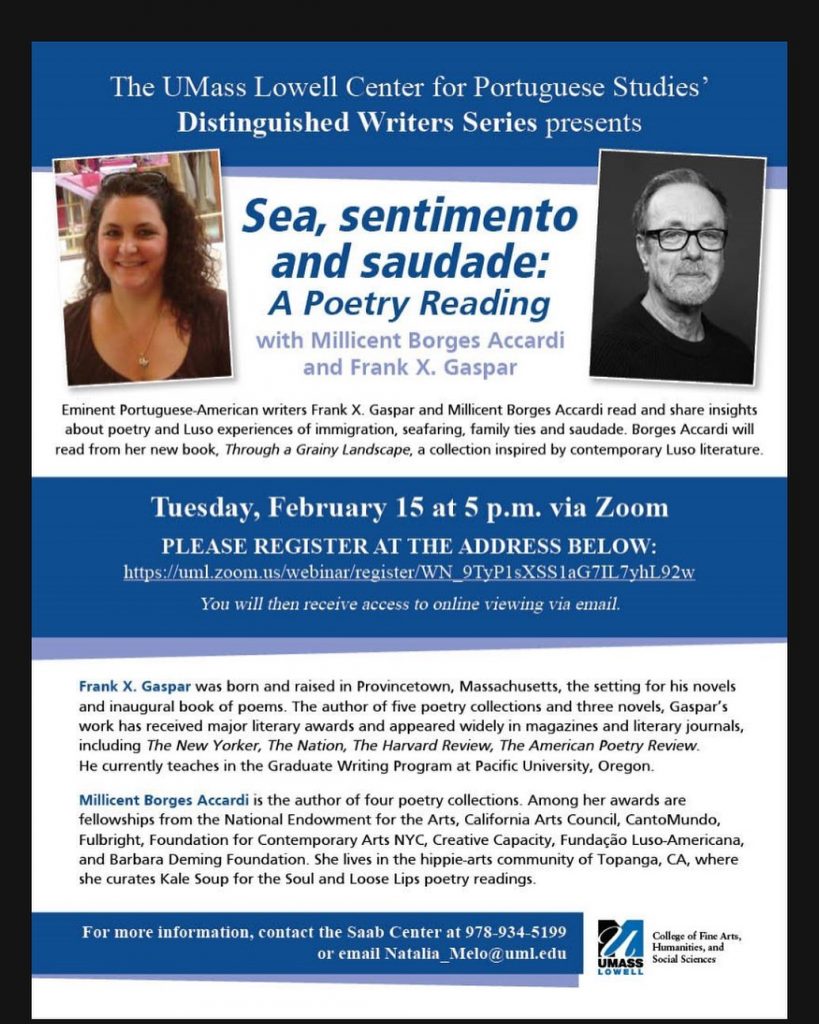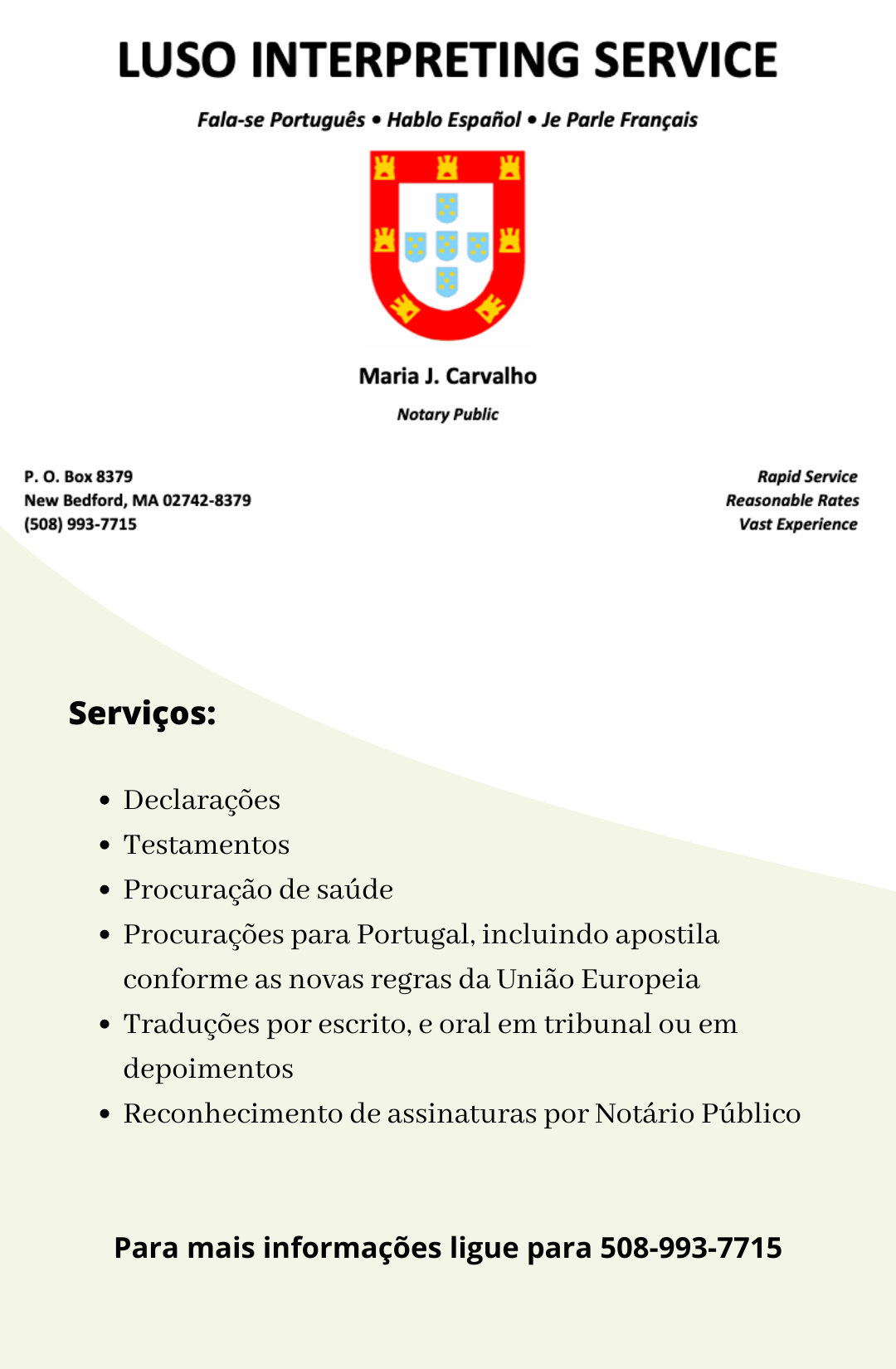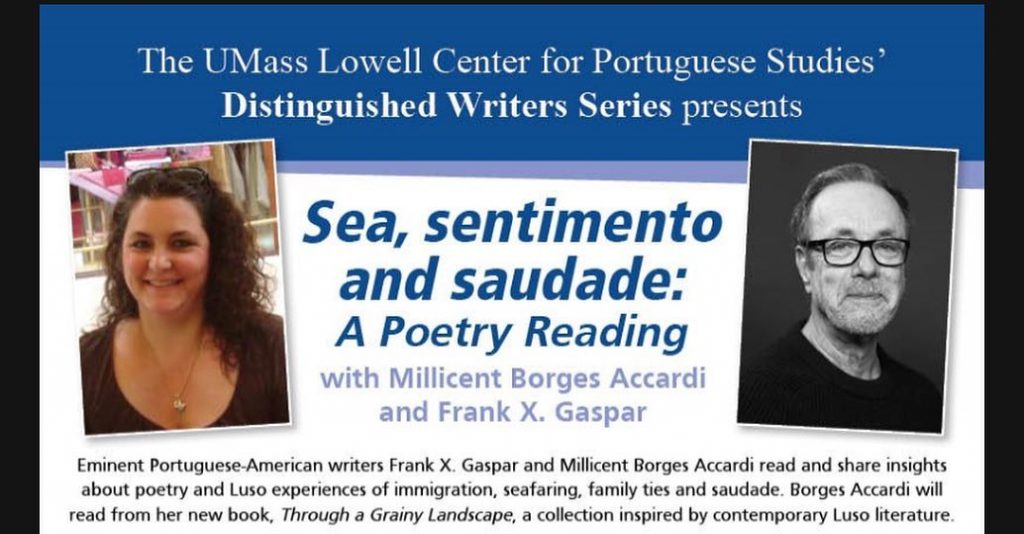Los Angeles, 16 Feb 2022 (Lusa) – The Lusodescendant poets Millicent Borges Accardi and Frank X. Gaspar hosted a reading and discussion session organized by the University of Massachusetts, Lowell, where the journey of Luso-American literature towards the ‘mainstream’ was debated.
“I question how difficult it seems to be for Portuguese-Americans, this vibrant and widespread ethnic group, to reach the mainstream of American literature, as other ethnic groups have,” noted Frank X. Gaspar, the son of Azorean immigrants who grew up in Provincetown, Massachusetts.
“We are vibrant writers and have interesting stories. The Portuguese diaspora is something that can fuel literature forever,” he continued. “But we seem to be marginalized.”
Organized by UMass Lowell’s Center for Portuguese Studies, the session titled “Sea, Sentiment and Saudade” highlighted the work of the two Portuguese-descended poets, including selected readings from Millicent Borges Accardi’s new book, “Through a Grainy Landscape.”

“It’s intriguing to me that before the 1980s and 1990s it was by a kind of fluke that [Portuguese-American] writers made it into the ‘mainstream,'” the poet said.
“Things are better now,” she considered, noting that in recent years she has met “hundreds” of Lusodescendent writers and artists. “If there is a magic key, it is unity,” she said, speaking of “building a community” and “forming new alliances” to chisel the space of Luso-American literature.
Both poets’ writing is heavily influenced by the emigration experience of their parents and grandparents, who left Portugal to seek a better life in the United States.
“I was always impressed by the courage it takes to leave, to go to another land and start a new life, learn a new language,” said Frank X. Gaspar. “These people did it with courage and humility,” he said. “It was lovely to grow up Portuguese in Provincetown.”
But neither Gaspar nor Accardi speak Portuguese well, something they tried to correct later in adulthood.
“We assimilate. That’s the reason I speak Portuguese so badly,” said Frank X. Gaspar. “The language disappeared in my generation.”
Accardi agreed, recounting that “there was no notion of bilingual homes” and that although she wanted to learn Portuguese, she didn’t have that opportunity while growing up.
“Assimilation goes through starting from scratch and maybe language was considered a negative thing,” she said. Speaking Portuguese “was like a defect.”
The historical assimilation of Portuguese emigrants may have given less visibility to Luso-American culture, which influenced the visibility of her literature.
“Even in my studies of world history I didn’t pick up any Portuguese authors,” referenced Frank X. Gaspar.
The poet recalled a visit to a large bookstore with authors from all over the world where he couldn’t find any of Portuguese origin. “What is the problem we have here?” he questioned. “What are we doing wrong?”
Frank Sousa, director of the Center for Portuguese Studies who moderated the session, said that there is now a “critical mass” of Portuguese-American authors and that this may be a moment of transition.
The professor also pointed out that the tradition of great literature by writers of Nordic or Irish-American origin has tended to dissipate, because with the generations the descendants are no longer considered ethnic and are just great American authors.
Artigo em Português
Literatura luso-americana avança em busca do reconhecimento no ‘mainstream’
Los Angeles, 16 fev 2022 (Lusa) – Os poetas lusodescendentes Millicent Borges Accardi e Frank X. Gaspar protagonizaram uma sessão de leitura e discussão organizada pela Universidade de Massachusetts, Lowell, onde foi debatida a jornada da literatura luso-americana em direção ao ‘mainstream’.
“Questiono o quão difícil parece ser para os luso-americanos, este grupo étnico vibrante e disseminado, chegar ao ‘mainstream’ da literatura americana, como outros grupos étnicos chegaram”, notou Frank X. Gaspar, filho de emigrantes açorianos que cresceu em Provincetown, Massachusetts.
“Somos escritores vibrantes e temos histórias interessantes. A diáspora portuguesa é algo que pode alimentar a literatura para sempre”, continuou. “Mas parece que somos marginalizados”.
Organizada pelo Centro de Estudos Portugueses da UMass Lowell, a sessão intitulada “Sea, Sentimento and Saudade” destacou a obra dos dois poetas lusodescendentes, incluindo leituras escolhidas do novo livro de Millicent Borges Accardi, “Through a Grainy Landscape”.
“É intrigante para mim que antes dos anos oitenta e noventa foi por uma espécie de acaso que escritores [luso-americanos] chegaram ao ‘mainstream’”, afirmou a poetisa.
“As coisas estão melhores agora”, considerou, referindo que nos últimos anos conheceu “centenas” de escritores e artistas lusodescendentes. “Se há uma chave mágica é a união”, disse, falando de “construir uma comunidade” e “formar novas alianças” para cinzelar o espaço da literatura luso-americana.

A escrita de ambos os poetas é fortemente influenciada pela experiência de emigração dos pais e avós, que deixaram Portugal para procurar uma vida melhor nos Estados Unidos.
“Sempre fiquei impressionado com a coragem que é necessária para ir embora, ir para outra terra e começar uma vida nova, aprender uma língua nova”, disse Frank X. Gaspar. “Estas pessoas fizeram-no com coragem e humildade”, afirmou. “Foi encantador crescer português em Provincetown”.
Mas nem Gaspar nem Accardi falam bem português, algo que tentaram corrigir mais tarde na vida adulta.
“Nós assimilamos. Essa é a razão pela qual falo tão mal português”, disse Frank X. Gaspar. “A língua desapareceu na minha geração.”
Accardi anuiu, contando que “não havia a noção de lares bilingues” e que, embora ela quisesse aprender português, não teve essa oportunidade enquanto crescia.
“A assimilação passa por começar do zero e talvez a língua fosse considerada uma coisa negativa”, disse. Falar português “era como se fosse um defeito”.
A histórica assimilação dos emigrantes portugueses pode ter dado menor visibilidade à cultura luso-americana, o que influenciou a visibilidade da sua literatura.
“Mesmo nos meus estudos de história mundial não apanhei qualquer autor português”, referenciou Frank X. Gaspar.
O poeta lembrou uma visita a uma grande livraria com autores de todo o mundo onde não conseguiu encontrar qualquer de origem portuguesa. “Qual é o problema que temos aqui?” questionou. “O que é estamos a fazer de errado?”
Frank Sousa, diretor do Centro de Estudos Portugueses que moderou a sessão, disse que existe agora uma “massa crítica” de autores luso-americanos e que este poderá ser um momento de transição.
O professor também lembrou que a tradição de grande literatura por escritores de origem nórdica ou irlandeses-americanos tendeu a dissipar-se, porque com as gerações os descendentes deixam de ser considerados étnicos e são apenas grandes autores americanos.





